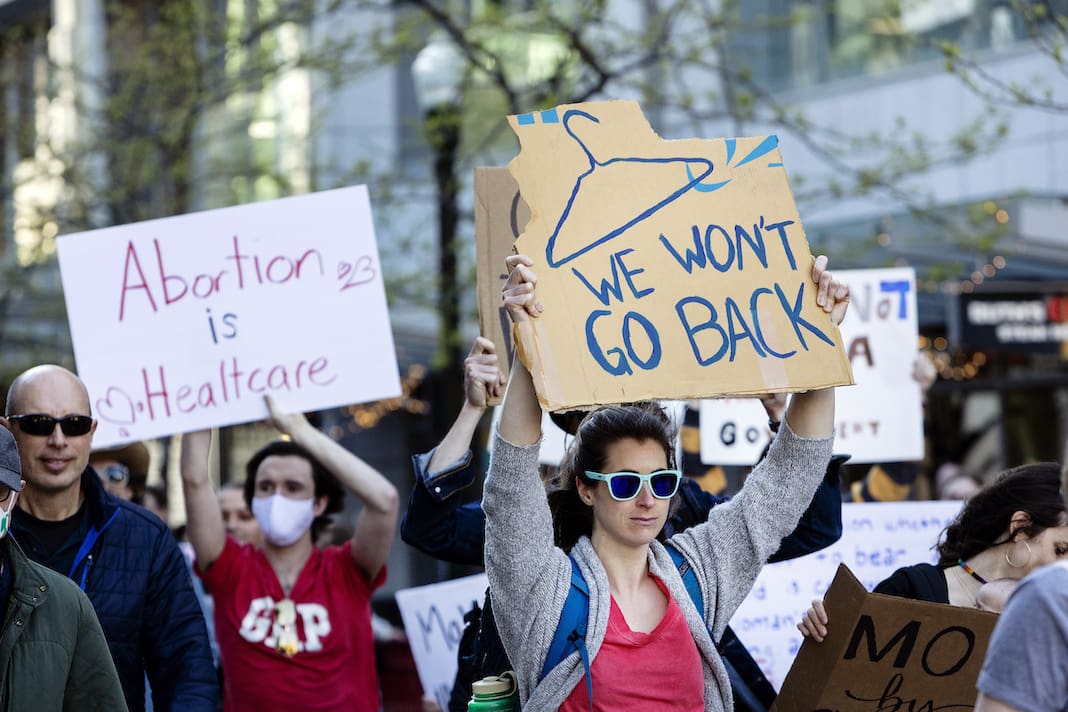States that restrict later abortion don't support pregnant people or their families
A new report reveals the unfortunate connection between restrictive abortion policies and a lack of support for new families.

Conservatives in several states are eager to attack the availability of later abortion, but they aren’t nearly as eager to protect people during pregnancy and support children and families after a child is born.
A new report from the nonprofit IBIS Reproductive Health, which tracks abortion policies, helps highlight the unfortunate connection between restrictive abortion policies and a lack of supportive policies. The latter are policies that improve access to health, support pregnant people, promote children’s health, education, and safety, and support family financial health.
Take Alabama, for example. Alabama currently has a ban that bars abortions later in pregnancy — 22 weeks after the last menstrual period. In 2019, the state passed a law — later blocked by the courts — that would have banned all abortions save for those when the mother’s health is at serious risk. The state also tried to use the coronavirus crisis to ban all abortions in the state.
By contrast, the state does very little to support pregnant people and ensure families thrive once a child is born. Alabama opted out of the Affordable Care Act’s expansion of Medicaid, leaving many people uninsured.
The American College of Obstetricians and Gynecologists says that uninsured women receive less prenatal care and are more likely to experience adverse outcomes, including low birth weight and infant mortality. The state also refuses to provide reasonable accommodations for pregnant workers and offers only unpaid family leave, capped at 12 weeks.
The situation is very similar in Texas, which also has a 22-week ban — and the second-highest amount of abortion restrictions in the country. Like Alabama, Texas opted out of the Medicaid expansion. The state also used the pandemic as an excuse to ban abortions. According to the investigative website ProPublica, the state has the highest rate of uninsured women of reproductive age in the country.
There’s also no law in Texas that companies offer paid sick leave, so pregnant people may have to continue working even when isn’t healthy for them to do so. And once children are born, there’s a waiting period for them to be eligible for the Children’s Health Insurance Program. Children in Texas must be uninsured for 90 days before they’re eligible for that health insurance.
Nebraska has a ban barring later abortions, and conservatives in the state are currently trying to ban the most common procedure used for later abortions.
However, when it comes to raising children, the state isn’t very supportive. There are no requirements children receive any sex education or HIV prevention information. There’s no physical education requirement in schools. Child care assistance for low-income families is highly restricted. If a family of three makes more than $27,012 per year, they don’t qualify.
In contrast, states that are very supportive of abortion rights, including for later abortions, also tend to have policies supportive of pregnant people and families.
Take Vermont, a state with no abortion restrictions. That state has expanded Medicaid, mandates paid sick leave, provides reasonable accommodations for pregnant workers, and has relatively generous limits for child care assistance and other programs.
Similarly, Colorado, which has few restrictions and offers later abortions at some clinics, provides a robust social safety net for pregnant people and for families after children are born. The state opted into the Medicaid expansion, provides early intervention services and support for children with developmental delays, and has a strong cash assistance plan.
As Terri-Ann Thompson, Ph.D., a senior associate at Ibis Reproductive Health, put it: “In states where it is harder for women to make choices about their pregnancy and to have a safe abortion, we also see that there are fewer policies in place that could support women and their children before and after pregnancy.”
Restrictions on later abortions are only one of those types of restrictions. However, those bans lead to people needing to seek care elsewhere, at greater cost, or to carry an unplanned or undesired pregnancy to term.
Published with permission of The American Independent Foundation.
Recommended

Missouri Planned Parenthood clinics remain ‘open to all’ despite new Medicaid restrictions
Planned Parenthood says they will continue offsetting the costs of seeing patients on Medicaid despite a bill signed into law Thursday
By Anna Spoerre, Missouri Independent - May 09, 2024
Fate of ‘game changer’ women’s health care bill in hands of Missouri Senate
A bill that would improve health care access for Missouri women almost died in the House after some lawmakers conflated birth control legislation with abortion medication
By Anna Spoerre, Missouri Independent - May 08, 2024
Trump leaves door open to banning medication abortion nationwide
Donald Trump is planning to release more details in the weeks ahead about how his administration would regulate access to medication abortion, according to comments he made during a lengthy interview with Time magazine published Tuesday.
By Jennifer Shutt, States Newsroom - April 30, 2024










































































